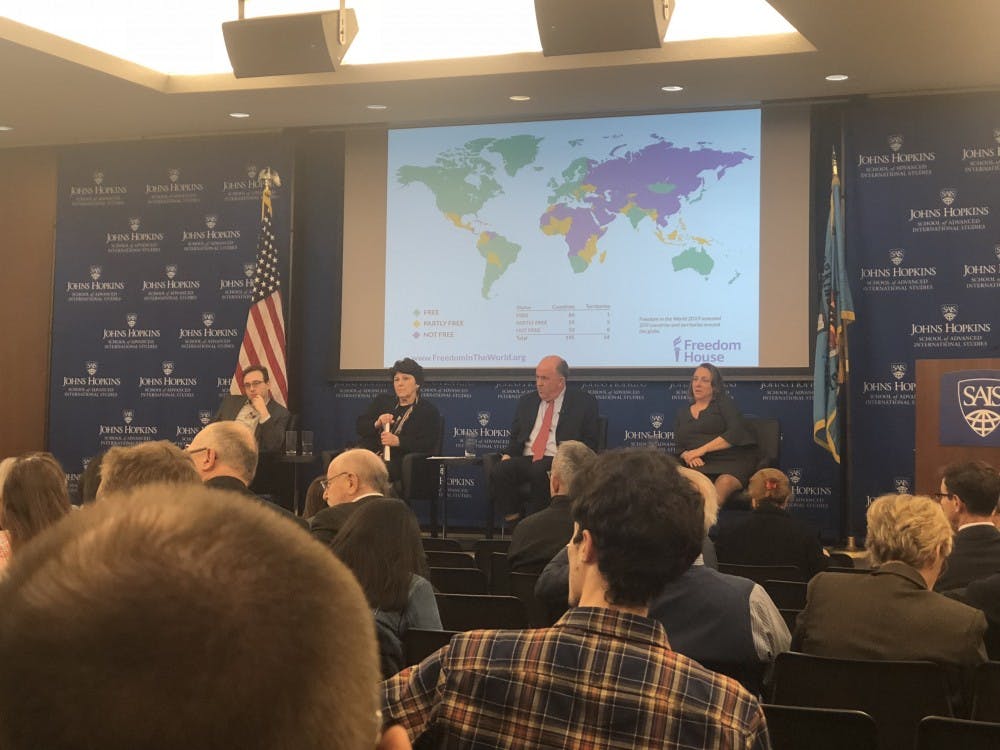Michael Abramowitz, the president of Freedom House, sat down with Karen DeYoung of The Washington Post and Yascha Mounk, political scientist at the Stavros Niarchos Foundation (SNF) Angora Institute, on Tuesday to discuss his organization’s recent report on the global state of democracy. The School of Advanced International Studies (SAIS), the SNF Agora Institute and Freedom House hosted the event, titled “Freedom in the World 2019: Democracy in Retreat.” Elise Labott, former CNN foreign affairs reporter, moderated the talk.
Dean of SAIS Vali Nasr introduced the panel and summarized the key findings of the full Freedom in the World 2019 report, which was released earlier that day.
“[This] is the 13th consecutive year of global democratic decline,” he said. “That means that every year for the past 13 years, there have been more countries that have experienced declines in civil rights and civil liberties than those that have improved them. This year 68 countries experienced declines; 50 experienced improvements.”
Mounk expanded on what 13 years of democratic recession means.
“The world, at least as far as political and civil liberties goes, is a much worse place today than it was about 13 years ago. We have seen in this past year countries transformed for the worse, in a way that has tremendous impact on the lives and freedoms of millions of human beings,” he said.
Mounk added that he appreciated that Freedom House reports democratic decline not just in places where political scientists had expected to find it but also in the countries where they least expected to.
“Democracy is always going to struggle... in countries without a deep democratic tradition,” he said. “What has been reflected in year after year of Freedom House reports is a deeper challenge about whether democracy is stable even in the couple of countries which... do have a deep democratic tradition.”
The fundamental problem Mounk identified was that authoritarian actors have not yet been forced to make a choice by the international community between mainstream acceptance and domestic repression. Leaders in countries like Poland and Hungary could continue to draw funds from the European Union even as they embarked on repressive regimes at home, according to Mounk.
As a result, he said, they have been socialized to understand that any threats made against them are not credible.
The panelists all expressed different opinions on President Trump’s relationship to American democratic institutions. DeYoung believes that real danger may only materialize if President Trump wins a second term, but she added that when she looks at how civic discourse and the media have transformed in response to President Trump, she does worry.
Abramowitz had a different understanding. He believes that American values are currently under a great deal of pressure.
“American institutions are strong,” he said. “But we have seen in other countries that when institutions are under this kind of pressure, democracy buckles. This is a time where we need to be cautious and alert to the dangers ahead.”
Mounk believes that democracy in the U.S. is already being seriously tested.
“Our institutions are not being subjected to attacks because, thank God, Donald Trump is a pretty poor populist,” Mounk said. “He does not have the strategic patience and discipline of Viktor Orbán of Hungary or Recep Erdoğan of Turkey or even a Hugo Chávez in Venezuela. Before we pronounce our institutions strong, I want to see them subjected to the attacks of an effective populist.”
Michelle Khazaryan, a second-year master’s student at SAIS, also attended the event. She said that she was interested in hearing from the experts what the future of democracy is as a form of government.
“I am interested in hearing their insights as to what global governance will look like if democracies are going to retreat and we are seeing a rise of authoritarianism around the world,” Khazaryan said.
Jake Stockman, a first-year master’s student at SAIS, said that the talk made him think about the different ways in which authoritarian populism manifests in the world, in both right-wing and left-wing regimes. During the talk, Mounk explained that he believed the fundamental structure of populist politics was more dangerous than the specific ideologies of a party.
“Some of the specific cases showed the complexity of these issues and confirmed my suspicion that there is no one-size-fits-all approach to evaluating populism,” Stockman said. “That is why I asked that question about the left and right; I see both emerging not only in the U.S. but globally. It is very interesting to see that there are different manifestations, but all together there are a certain set of threats that they seem to pose to democratic societies and institutions.”





